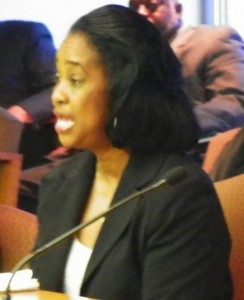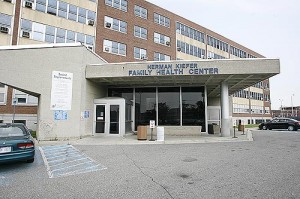
- DHWP Director Loretta Davis (center) speaks at Council May 16, 2012 as Deputy Director Betsy Pash (left) listens; the two have incorporated the “Institute for Population Health”
Council, unions object to plan engineered by Engler, Snyder appointees
By Diane Bukowski
May 19, 2012
DETROIT – The fall-out from the Detroit consent agreement with the state continued May 17 as Loretta V. Davis, Director of the Department of Health and Wellness Promotion (DHWP), told City Council she wants to strip DHWP of its entire $54.3 million in federal and state grant funding and $10.2 million in fee revenues, lay off 400 workers, and bust the union.
Davis’ plan gives all grant funds and revenues to a private “Institute for Population Health” (IPH). The department only gets $5 million a year from the city’s general fund, which Mayor Dave Bing zeroed out in his budget plan. The plan also says that the current DHWP headquarters at Herman Kiefer Health Complex on Taylor is “no longer sustainable,” although the city recently spent millions to renovate it.
Such institutes have not developed a way to determine whether they positively influence public health in 50 years of existence, according to an article published by the Michigan Public Health Institute. Davis said the state has already approved the plan, but Council members contended that their approval is necessary for the plan to take effect.
(Click on DWHP IHP for seven page document Davis presented to Council outlining her plans.)
“NOTHING BUT UNION-BUSTING”
“We provide services to 300,000 clients annually,” Laurie Walker, President of AFSCME Health Department Local 457 told the Council. “We enjoy our positions and care about the people. We live in the city, own homes here, and pay taxes. Last year, two city workers on my block were laid off and now their homes are vacant. I will have to consider moving as well even though I love this city. I believe the Institute is nothing but union-busting.”
The Department currently provides Maternal and Infant Health Programs, in a city where the 2009 infant mortality rate was 14.8 per 1,000, more than double the national average of 6.3 per 1,000. It provides WIC (a federal food program for women, infants and children), immunizations, lead screening, vision and hearing testing, family planning, and substance abuse treatment among other services. Its vital records division and adult and pediatric dental clinics are self-sustaining through fees.
DHWP has already shut down its adult medical services at the Herman Kiefer Health Clinic and Grace Ross Health Center, Walker told VOD earlier. She told the Council that Davis met with DWHP workers May 16 to inform them they would be laid-off, and that they could apply for 250 non-union jobs at the new Institute
Scicilla Hunt, President of AFSCME Local 273, representing nurses, Greg Murray, President of the Society of Accountants, Analysts and Appraisers (SAAA), and DeAngelo Malcolm, AFSCME Council 25 staff representative, also blasted the plan at the hearing.
DAVIS PREVIOUSLY WORKED AT WAYNE COUNTY HEALTH DEPT.
Davis began work as the city’s DHWP director Sept. 2011. She was Health Officer for the Wayne County Department of Health beginning in 2007, a fact that has been kept under wraps in daily media reports. Wayne County government under Robert Ficano has been wracked with scandals and is under investigation by the FBI.
Davis and Deputy Director Betsy Pash, who was previously Administrative Deputy Director for the Michigan Department of Community Health under Governor Rick Snyder, incorporated the “Institute for Population Health” as a non-profit with the state May 2, according to state records.The IRS has not yet approved it for non-profit status.
Davis said the IPH already has officers, a board of directors, a budget, and a “draft plan” approved by the state. Despite its new-born status, Davis claimed the Institute would be functioning by Oct. 1 after lay-offs on June 28 and September 28.
“The Institute for Population Health would contract directly with the state of Michigan,” Davis said. “Protection of the public’s health is the state’s responsibility, which it has decided to delegate to local health departments, in 1978 to the Detroit health department. The Institute will sustain itself through grant funding and collection of revenues and fees. A draft plan has been approved by the State of Michigan, a diverse board has been created, by-laws have been approved, and a budget has been developed. We are working with [attorney] Floyd Allen who is acting pro bono.”
She added that the Animal Control Center (ACC) currently run by DWHP would be transferred to the Police Department. Fiscal Analysis Director Irving Corley, however, said no funds to run the ACC have been included in that department’s budget. Councilman Brown, a former police officer, said the division was transferred out of the Police Department years ago because many police tend only to shoot dogs.
COUNCIL MEMBERS SAY THEY WERE NOT CONSULTED, MUST APPROVE PLAN
“The Council has not even acted on the budget yet,” Councilwoman JoAnn Watson objected after Walker spoke, “The Department staff is not in charge. The Council has not voted to contract with this Institute.”
She noted that the proposal violates the Successor Clause of union contracts, which provide that employees in Departments that are shutting down be transferred to any successor entity. She asked why the IPH incorporators had not approached the Detroit Wayne County Health Authority, already in existence, instead if they wanted an alternate organization.
“The Mayor proposes, the Council disposes,” commented Councilman Kwame Kenyatta.
Even Council members Gary Brown, Saunteel Jenkins, and Kenneth Cockrel, Jr. who voted for the consent agreement, challenged Davis’ authority to found the institute and transfer funding and services without Council consent.
David Whitaker, Director of the Council’s Research and Analysis Division, confirmed that the plan cannot be carried forward without Council approval. The Council eventually voted to move the matter to Executive Session.
THE PLAYERS
Along with Davis, originally from the Wayne County Health Department, and Pash, from the Michigan Department of Community Health, players behind the scenes have questionable ties.

DMC General Counsel Floyd Allen (right) with officials including Vanguard's Trip Pilgrim and DMC CEO Mike Duggan at center, during meeting prior to Vanguard takeover of DMC
Floyd Allen and his law firm acted as the agent for the IPH in its incorporation papers. , Allen is also General Counsel for the Detroit Medical Center, whose services are provided through the for-profit Vanguard Health Systems, based in Tennessee and 70 percent owned by the Blackstone Group, one of the world’s largest private equity (hedge fund) firms.
Jean Chabut, currently Deputy Director of the Michigan Department of Community Health under Governor Rick Snyder and Director Maura Corrigan, as well as CEO of the Michigan Public Health Institute (MPHI), also supports the plan. Chabut and Vernice Anthony Davis, quoted in Detroit Free Press articles lauding the plan, both previously worked at the Detroit Health Department in executive positions.

2011-2012 MPHI Board of Directors (l to r backs row) Jeffrey R. Taylor, Jennifer Jordan, Michael R. Rip, James Giordano, Dean Smith, Melanie Brim; (l to r front row) Dawn Misra, Allen Goodman, Jean Chabut, Dele Davies; not pictured Not Pictured: Daniel Hale, Adnan Hammad, Mary Kushion, Sarah Mayberry, Phyllis Meadows, Bradley Patterson.
Chabut’s participation is noteworthy because of her role with the MPHI.
According to “Public Health Institutes: The Michigan Experience,” by Kevin Piggot, MD, MPH, there are currently 32 Public Health Institutes in the National Network of Public Health Institutes. He said they function as “intermediaries, honest brokers, and shuttle diplomats,” but does not note that they provide direct service to the public. They receive funding from private foundations, federal and state grants, and health insurance companies.
He notes, however, that “Ultimately the success of the PHI’s may be reasonably expected to translate into improved population health. The evidence for such, however is lacking as was pointed out by the MPHI in 1999, ‘there has been no effort to quantify the impact of public health institutes on the public’s health within their states.”
No such methodology has been developed to date, he says. (Click on MPHI doc to read entire article.)
MPHI’s 2010 tax filing with the IRS indicates that it raked in $37.5 million from “program service revenue,” with a paltry $46,709 from “contributions and grants.”
However, it states that its reason for non-profit status is that it “normally receives a substantial part of its support from a governmental unit or from the general public.” According to a separate attachment, most of its revenue appears to have come from providing “technical assistance” to various agencies. (Click on MPHI Form 990 2010 to read entire filing.)

Vernice Davis Anthony ironically stands at Workers' Memorial in Hart Plaza in Free Press photo with puff piece written by Freep reporter Pat Anstett.
IPH consultant Vernice Davis-Anthony was Director of the Michigan Department of Public Health under Governor John Engler. She retired as CEO of the corporate-affiliated Greater Detroit Area Health Council in Dec. 2011 and also serves on the Wayne County Airport Authority.
“Initial funding for the MPHI [founded in 1988] was secured by Vernice Anthony Davis, [then] Board President and State Director of MDPH, from the W.K. Kellogg Foundation,”says Piggott. Detroit Free Press medical writer Pat Anstett extensively quoted Anthony Davis in her first article on the IPH (click on Detroit proposal calls for transforming health department into an institute ). Anstett said she had already obtained the document given to Council May 17, likely from Anthony Davis. Anstett wrote a puff piece on her when she was president of the Greater Detroit Health Action Council (click on Vernice Davis Anthony Eleanor Josaitis Unsung Hero Award Anstett article, ).
Anstett made no attempt to contact Health Department union representatives or workers in her initial articles on the IPH for the other side of the story. Although Free Press writers Matt Helms and Suzette Hackney attended the Council session on the Health Department, the Free Press has not yet published any article by them.
See VOD story on true Health Department history below.









